初中英语语法知识—介词的解析(2)
初中英语语法学习之介词与介词短语讲义
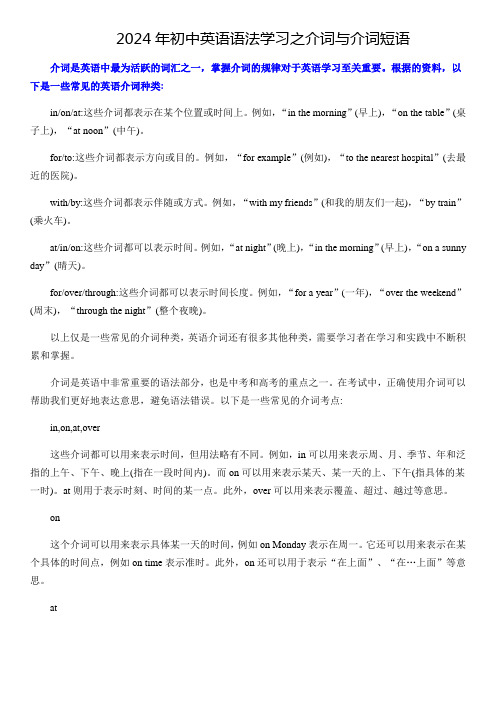
2024年初中英语语法学习之介词与介词短语介词是英语中最为活跃的词汇之一,掌握介词的规律对于英语学习至关重要。
根据的资料,以下是一些常见的英语介词种类:in/on/at:这些介词都表示在某个位置或时间上。
例如,“in the morning”(早上),“on the table”(桌子上),“at noon”(中午)。
for/to:这些介词都表示方向或目的。
例如,“for example”(例如),“to the nearest hospital”(去最近的医院)。
with/by:这些介词都表示伴随或方式。
例如,“with my friends”(和我的朋友们一起),“by train”(乘火车)。
at/in/on:这些介词都可以表示时间。
例如,“at night”(晚上),“in the morning”(早上),“on a sunny day”(晴天)。
for/over/through:这些介词都可以表示时间长度。
例如,“for a year”(一年),“over the weekend”(周末),“through the night”(整个夜晚)。
以上仅是一些常见的介词种类,英语介词还有很多其他种类,需要学习者在学习和实践中不断积累和掌握。
介词是英语中非常重要的语法部分,也是中考和高考的重点之一。
在考试中,正确使用介词可以帮助我们更好地表达意思,避免语法错误。
以下是一些常见的介词考点:in,on,at,over这些介词都可以用来表示时间,但用法略有不同。
例如,in可以用来表示周、月、季节、年和泛指的上午、下午、晚上(指在一段时间内)。
而on可以用来表示某天、某一天的上、下午(指具体的某一时)。
at则用于表示时刻、时间的某一点。
此外,over可以用来表示覆盖、超过、越过等意思。
on这个介词可以用来表示具体某一天的时间,例如on Monday表示在周一。
它还可以用来表示在某个具体的时间点,例如on time表示准时。
初中英语语法知识—介词的分类汇编及答案(2)
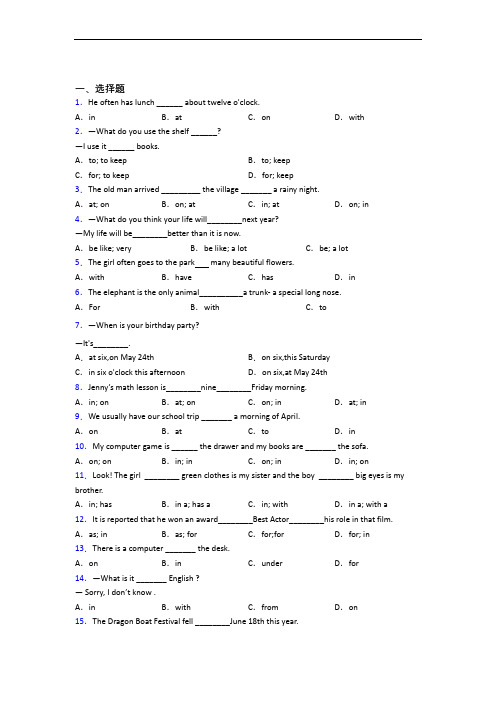
一、选择题1.He often has lunch ______ about twelve o'clock.A.in B.at C.on D.with 2.—What do you use the shelf ______?—I use it ______ books.A.to; to keep B.to; keepC.for; to keep D.for; keep3.The old man arrived _________ the village _______ a rainy night.A.at; on B.on; at C.in; at D.on; in 4.—What do you think your life will________next year?—My life will be________better than it is now.A.be like; very B.be like; a lot C.be; a lot5.The girl often goes to the park many beautiful flowers.A.with B.have C.has D.in6.The elephant is the only animal__________a trunk- a special long nose.A.For B.with C.to7.—When is your birthday party?—It's________.A.at six,on May 24th B.on six,this SaturdayC.in six o'clock this afternoon D.on six,at May 24th8.Jenny’s math lesson is________nine________Friday morning.A.in; on B.at; on C.on; in D.at; in9.We usually have our school trip _______ a morning of April.A.on B.at C.to D.in10.My computer game is ______ the drawer and my books are _______ the sofa. A.on; on B.in; in C.on; in D.in; on 11.Look! The girl ________ green clothes is my sister and the boy ________ big eyes is my brother.A.in; has B.in a; has a C.in; with D.in a; with a 12.It is reported that he won an award________Best Actor________his role in that film. A.as; in B.as; for C.for;for D.for; in 13.There is a computer _______ the desk.A.on B.in C.under D.for 14.—What is it _______ English ?—Sorry, I don’t know .A.in B.with C.from D.on15.The Dragon Boat Festival fell ________June 18th this year.A.in B.to C.on D.from16.My friend, Henry was born June 10th, 1997.A.in B.on C.at D.for17.There________ a hamburger and bananas________there.A.is;in B.are;in C.is;/ D.are;/18.They got married_______ 1960. That means they have been married _______ 1960. A.at; since B.on; in C.in; since D.for; since 19.—It's wonderful, isn't it?— Yes, The large grassland, reaching out far away, looks very beautiful________the blue and clean sky.A.against B.above C.through D.past20.He has a garden __________ a lot of flowers.A.has B.there is C.with21.(2017年安徽) To my pleasure, my family is always _____ me whatever I decide to do. A.above B.behind C.from D.through22.We started out in early spring and headed west the northern part of Asia. A.through B.between C.among D.across23.The next Olympic Games will be held in Japan________ 27th July 2020.A.on B.in C.at D.of24.I want to learn English well because I don’t want to talk with foreigners ________ anybody else.A.by B.through C.across D.at25.–Emma can go out ________ school nights but she must be back ________ ten o’clock.--Oh, I see.A.on, before B.on, after C.in, before D.in, after【参考答案】***试卷处理标记,请不要删除一、选择题1.B解析:B【解析】【分析】【详解】句意:他经常在大约十二点吃午餐。
初中英语语法基础——常见介词用法辨析和同步练习题 (有参考答案)

初中英语语法基础——常见介词用法辨析一、“介词”的重要地位:介词是初中的英语的重点,其中一些意思相近的易混淆的介词区分更是需要我们理清楚。
今天就帮你总结一下初中阶段高频出现的一些易混淆的介词用法,让你从此告别看到意思相近介词就一脸懵的囧状。
二、常见介词短语辨析:(1) as, likeas表示“作为”强调身份,like(介词)表示“像”As a teacher, he cares for these children.Like a teacher, he cares for these children.(2) with, inwith表示“外貌特征或附带的东西” ; “用……作工具”in表示“衣着”;“用某语言”,在固定搭配中也可用in。
A man with dark glasses wanted to buy drinks.A man in black wanted to buy drinks.The boy is learning to write in pencil / with a pencil.He retold the text in English.(3) for, tofor表示“为了”;to表示动作对象, “对, 向”He would do anything for his motherland.Did you mention this to my father? 你对我父亲提起过这件事吗?for 表示“就某情况而说”;to 表示一“对某对象而言”It’s quite warm today for February. 就二月的天气,今天够暖和的。
What he told you just now wasn’t new to me. 他刚对你说的话对我并不新鲜。
(4) except, besidesexcept表示“除……之外”,不包括在内, 指从总体中排除一部分;besides表示“除……之外”,包括在内,指除了一部分还有另一部分。
初中英语语法知识—介词的分类汇编含答案解析(2)

一、选择题1.I can’t go out ________ school nights because I have to finish my homework first.A.at B.in C.on2.I bought the tomatoes ________ the vegetable stall.A.at B.in C.on D.from3.—Do you know the girl ________ red skirts?—Yes, she is my sister.A.at B.on C.in D.to4.The girl often goes to the park many beautiful flowers.A.with B.have C.has D.in5.The bird’s singing came into my room ______ the window and woke me up in the early morning.A.down B.from C.through D.across6.Lily and Lucy _______ their mother. They have big eyes and yellow hair.A.like both B.both are like C.both like D.are both like 7.—Mary's birthday is ________ March. What about Lucy's?—Her birthday is ________ December 10th.A.in;on B.on;in C.on;on8.My uncle has taught in this school________ he was twenty years old.A.after B.for C.until D.since9.It’s necessary for Tony to do ____ thing ____ his classmates do.A.same, as B.same, like C.the same, to D.the same, as10.Taiwan is __________ the southeast of China and Hunan is __________ the south of Hubei. A.in;in B.in;on C.on;in D.on;to11.If you can’t read the article, it will be meaningless to you. The –less in the word “meaningless” means .A.with B.without C.full of D.out of 12.North Korea is________Asia. It’s________the northeast of China and________the west of Japan.A.in, to, on B.in, on, to C.on, in, to D.to, on, in 13.He is__________ outgoing student long hair..A.a,with, B.an,with C.a,of D.an,of 14.—What is it _______ English ?—Sorry, I don’t know .A.in B.with C.from D.on15.We usually have our school trip _______ a morning of April.A.on B.at C.to D.in16.Jim and Tim are talking _______ the phone.A.at B.on C.with D.in17.The accident took place ________ a cold February evening.A.on B.in C.at D.for18.It is not easy to cross the river ________ a ropeway.A.from B.with C.by D.on19.My daughter usually gets up at 6:00 ________ the morning, but ________ Sunday morning she gets up at 8:00.A.in; in B.in; on C.on; in D.on; on20.---Do you prefer coffee _____milk in it?---Sometimes, but most of the time I ______drink black coffee.A.or, would rather B.with, prefer C.with, would rather D.to, prefer21.If success is a gate, the road this gate must be made up of difficulties.A.towards B.against C.opposite D.beyond 22.Nature has given us the ability to learn________watching others. Children do it naturally. A.by B.in C.on23.I have to prepare ________my math test________ Friday afternoon.A.at; on B.for; on C.on ;for24.He has a garden __________ a lot of flowers.A.has B.there is C.with25.Thanks ______your family photos, they are very nice.A.to B.in C.for D.at【参考答案】***试卷处理标记,请不要删除一、选择题1.C解析:C【解析】【分析】【详解】句意:在学校我晚上不能出去,因为我必须先完成作业。
初中英语介词用法总结
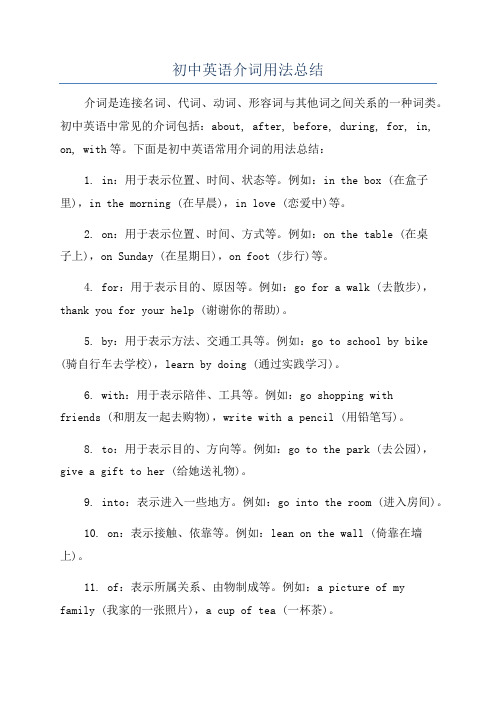
初中英语介词用法总结介词是连接名词、代词、动词、形容词与其他词之间关系的一种词类。
初中英语中常见的介词包括:about, after, before, during, for, in, on, with等。
下面是初中英语常用介词的用法总结:1. in:用于表示位置、时间、状态等。
例如:in the box (在盒子里),in the morning (在早晨),in love (恋爱中)等。
2. on:用于表示位置、时间、方式等。
例如:on the table (在桌子上),on Sunday (在星期日),on foot (步行)等。
4. for:用于表示目的、原因等。
例如:go for a walk (去散步),thank you for your help (谢谢你的帮助)。
5. by:用于表示方法、交通工具等。
例如:go to school by bike (骑自行车去学校),learn by doing (通过实践学习)。
6. with:用于表示陪伴、工具等。
例如:go shopping withfriends (和朋友一起去购物),write with a pencil (用铅笔写)。
8. to:用于表示目的、方向等。
例如:go to the park (去公园),give a gift to her (给她送礼物)。
9. into:表示进入一些地方。
例如:go into the room (进入房间)。
10. on:表示接触、依靠等。
例如:lean on the wall (倚靠在墙上)。
11. of:表示所属关系、由物制成等。
例如:a picture of myfamily (我家的一张照片),a cup of tea (一杯茶)。
12. with:表示伴随、具有。
例如:a girl with long hair (一个长发的女孩),a book with pictures (一本有图片的书)。
(完整版)初中英语语法介词用法讲解与练习
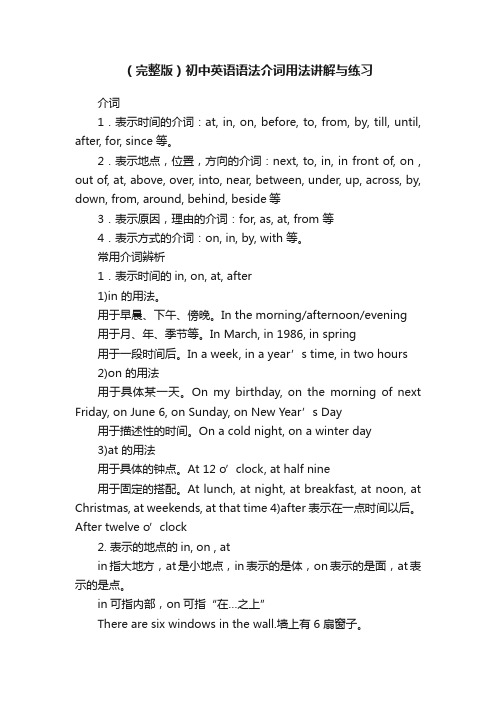
(完整版)初中英语语法介词用法讲解与练习介词1.表示时间的介词:at, in, on, before, to, from, by, till, until, after, for, since 等。
2.表示地点,位置,方向的介词:next, to, in, in front of, on , out of, at, above, over, into, near, between, under, up, across, by, down, from, around, behind, beside等3.表示原因,理由的介词:for, as, at, from 等4.表示方式的介词:on, in, by, with 等。
常用介词辨析1.表示时间的in, on, at, after1)in 的用法。
用于早晨、下午、傍晚。
In the morning/afternoon/evening用于月、年、季节等。
In March, in 1986, in spring用于一段时间后。
In a week, in a year’s time, in two hours2)on 的用法用于具体某一天。
On my birthday, on the morning of next Friday, on June 6, on Sunday, on New Year’s Day用于描述性的时间。
On a cold night, on a winter day3)at 的用法用于具体的钟点。
At 12 o’clock, at half nine用于固定的搭配。
At lunch, at night, at breakfast, at noon, at Christmas, at weekends, at that time 4)after 表示在一点时间以后。
After twelve o’clock2. 表示的地点的in, on , atin指大地方,at是小地点,in表示的是体,on表示的是面,at表示的是点。
2021年初中英语语法知识—介词的知识点(2)

一、选择题1.My computer game is ______ the drawer and my books are _______ the sofa.A.on; on B.in; in C.on; in D.in; on 2.—There is a hole in the wall. What is it for?—We have a dog. He can get in or out ________ it.A.past B.through C.across D.over3.—What do you think your life will________next year?—My life will be________better than it is now.A.be like; very B.be like; a lot C.be; a lot4.I bought the tomatoes ________ the vegetable stall.A.at B.in C.on D.from5.—Do you know the girl ________ red skirts?—Yes, she is my sister.A.at B.on C.in D.to6.The bird’s singing came into my room ______ the window and woke me up in the early morning.A.down B.from C.through D.across7.--There are many theatres _________the island.--Yes, Broadway is the southern end of the island..A.at; at B.on; on C.at; on D.on; at8.The moonlight is shining in the window. Everything in the room looks so beautiful. A.over B.through C.across D.past9.She is talented ________ music but I am good at sports.A.at B.in C.on10.Taiwan is __________ the southeast of China and Hunan is __________ the south of Hubei. A.in;in B.in;on C.on;in D.on;to11.He often plays basketball ______five o’clock.A.in B.for C.on D.at12.It is reported that he won an award________Best Actor________his role in that film. A.as; in B.as; for C.for;for D.for; in 13.—How long have you lived in this town?—________2001.A.since B.in. C.for14.The next Olympic Games will be held in Japan________ 27th July 2020.A.on B.in C.at D.of15.Look! The girl ________ green clothes is my sister and the boy ________ big eyes is my brother.A.in; has B.in a; has a C.in; with D.in a; with a16.—Where is Tom?—He is playing football ___________ the playground.A.of B.to C.on D.from17.The accident took place ________ a cold February evening.A.on B.in C.at D.for18.Bill doesn't like playing football,but he often watches football matches (比赛)_____ TV. A.in B.on C.to D.with19.My daughter usually gets up at 6:00 ________ the morning, but ________ Sunday morning she gets up at 8:00.A.in; in B.in; on C.on; in D.on; on20.This pair of jeans looks nice _____ Sandy, because she looks very nice _____ blue. A.on; in B.in; on C.for; on D.to; in21.Did you read the news________the newspapers that Yang Jiang passed away (去世)________the morning of May 25th?A.in; in B.on; in C.in; on D.on; on 22.Nature has given us the ability to learn________watching others. Children do it naturally. A.by B.in C.on23.After working her way around the world, Annie ended up English as a foreign language. A.teach B.taughtC.teaching D.to teach24.I have to prepare ________my math test________ Friday afternoon.A.at; on B.for; on C.on ;for25.If you can’t read the article, it will be meaningless to you. The –less in the word “meaningless” mea ns .A.with B.without C.full of D.out of【参考答案】***试卷处理标记,请不要删除一、选择题1.D解析:D【解析】句意:我的电脑游戏在抽屉里,我的书在沙发上。
初中英语语法复习:介词(中考总复习)

over
经过、跨越。
我们必须越过那座山。
专题五 介 词
返回目录
介词
含义及用法
例句
方
After you go through the gate, you’ll
位
意为“穿过;通过;经过”,
through
see a beautiful garden. 穿过门之后,
指从空间内部通过。
介
你将看到一个美丽的花园。
升
-He came_______Monday.
A.in
B.on
C.to
D.by
专题五 介 词
8.-Please tell me your decision_______tomorrow morning, OK?
拓
-No problem.I will call you tonight.
展
A.before B.during C.through D.since
(台湾是中国的一部分)
专题五 介 词
返回目录
介词
含义及用法
举例
表示“在……(的平面)上”。 on the desk在桌上
(即: )
on the wall在墙上
方
on 表示A地位于B地的外面且接壤 Hunan Province lies on the west of
。 位
(即: )
Jiangxi Province.湖南省在江西省西 边。(湖南省同江西省接壤)
by
the kids playing outside.简站在窗户
位
靠近
旁边,看着外面玩耍的孩子们。
介
There is a football behind the table.
介词的用法总结
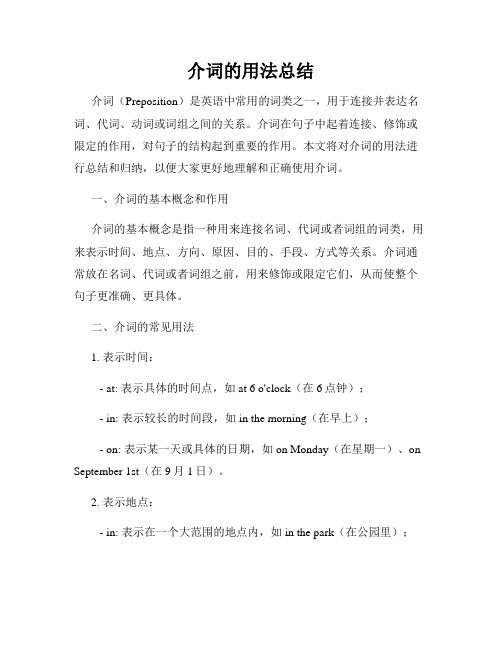
介词的用法总结介词(Preposition)是英语中常用的词类之一,用于连接并表达名词、代词、动词或词组之间的关系。
介词在句子中起着连接、修饰或限定的作用,对句子的结构起到重要的作用。
本文将对介词的用法进行总结和归纳,以便大家更好地理解和正确使用介词。
一、介词的基本概念和作用介词的基本概念是指一种用来连接名词、代词或者词组的词类,用来表示时间、地点、方向、原因、目的、手段、方式等关系。
介词通常放在名词、代词或者词组之前,用来修饰或限定它们,从而使整个句子更准确、更具体。
二、介词的常见用法1. 表示时间:- at: 表示具体的时间点,如at 6 o'clock(在6点钟);- in: 表示较长的时间段,如in the morning(在早上);- on: 表示某一天或具体的日期,如on Monday(在星期一)、on September 1st(在9月1日)。
2. 表示地点:- in: 表示在一个大范围的地点内,如in the park(在公园里);- at: 表示在一个小范围或精确的地点,如at the cinema(在电影院);- on: 表示在某个平面上或者与表面接触,如on the table(在桌子上)。
3. 表示方向:- to: 表示朝向某个地点或目的地,如go to school(去学校);- from: 表示起始地点,如come from China(来自中国);- towards: 表示朝向某个方向,如walk towards the park(走向公园)。
4. 表示原因:- because of: 表示由于某个原因,如because of the rain(因为下雨);- due to: 表示由于某个原因,如due to the bad weather(由于天气恶劣)。
5. 表示目的:- for: 表示为了某个目的,如study for the exam(为了考试而学习);- to: 表示某个行动的目的,如go to the park(去公园)。
初中英语语法大全——介词(共21张PPT)word版本

表示“在......上”的above,over与on
表示“在......下面”的below与under
*①below表示“在......下面”时,指处于比某物低的位置,不一定 在某物的正下方。它在的反义词是above。如:Write your name below the line.
We are below the moon.
表示“大约”的about,around
*about表示“大约”时,常与较确定的数字连用,位于 数词的前面,多用来表达时间、年龄和日期。如:It’s about ten o’clock. 现在大约十点。 The girl is about ten years old. *around表示“大约”时,多用于美国英语,常与较确定 的数字连用,位于数词的前面,通常用来表达时间、距离、 重量、货币等。如: I’ll be back at around 5 o’clock. The machine weighed around 30 pounds. The company has around $1.3 billion in debt.
表示时间的at,on与in *on表示时间用于在某一天或某天的某个时候, on后常接某日,星期几、某日或某日的朝夕,某 日的上午、下午或晚上,节日等。如:on Sunday在星期天;on Christmas morning在圣 诞节的早上;on May the first在五月一日;on a cold morning在一个寒冷的早上;on a warm morning in April在四月一个温暖的上午;on a December night在12月的一个夜晚;on the afternoon 在那天下午;on the following night在第二天晚上;on October 1,1949在 1949年10月1日;on New Year’s Day在新年; on New Year’s Eve在除夕;on the morning of the 15th在15日的早上。
初中英语语法基础——介词专题讲解 (附同步练习试题)
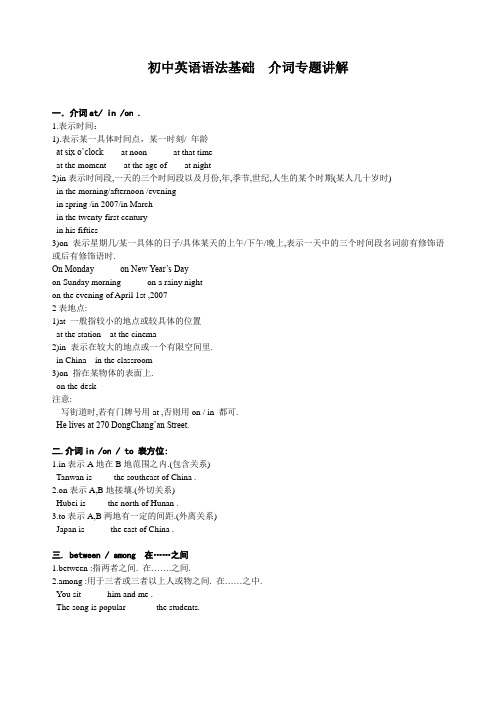
初中英语语法基础介词专题讲解一.介词at/ in /on .1.表示时间:1).表示某一具体时间点,某一时刻/ 年龄at six o’clock at noon at that timeat the moment at the age of at night2)in表示时间段,一天的三个时间段以及月份,年,季节,世纪,人生的某个时期(某人几十岁时)in the morning/afternoon /eveningin spring /in 2007/in Marchin the twenty-first centuryin his fifties3)on表示星期几/某一具体的日子/具体某天的上午/下午/晚上,表示一天中的三个时间段名词前有修饰语或后有修饰语时.On Monday on New Year’s Dayon Sunday morning on a rainy nighton the evening of April 1st ,20072表地点:1)at 一般指较小的地点或较具体的位置at the station at the cinema2)in 表示在较大的地点或一个有限空间里.in China in the classroom3)on 指在某物体的表面上.on the desk注意:写街道时,若有门牌号用at ,否则用on / in 都可.He lives at 270 DongChang’an Street.二.介词in /on / to 表方位:1.in表示A地在B地范围之内.(包含关系)Tanwan is ____ the southeast of China .2.on表示A,B地接壤.(外切关系)Hubei is ____ the north of Hunan .3.to表示A,B两地有一定的间距.(外离关系)Japan is _____ the east of China .三. between / among 在……之间1.between :指两者之间. 在…….之间.2.among :用于三者或三者以上人或物之间. 在……之中.You sit _____ him and me .The song is popular ______ the students.四.after / in 在……之后 before / in 在……之前1. after1)after + 时间段. 表示以过去某一时刻为起点的一段时间之后, 用于过去时.2)after 作介词. after doing sth.2.in +一段时间. 表示说话时或以现在为起点的将来一段时间之后.用于将来时.He came back ______ two days .He will go home___finishing his homework .He will come back _____ two days .3. before 多用于时间点或一件事之前发生,即“先于……;在……之前”He left the office bofore I got there. I’ll be back before five o’clock.4. ago 时间段+ ago 表示“多久之前”时态通常用:一般过去时I met Tom two days ago.五.with / in / by 表示“用……”1.with 表示“用…” 一般指有形的工具/ 手段/ 人体器官.He cut the apple into halves ____ a knife .注: with 表伴随, “带有,含有”He came in _____ a big smile on his face .2.in表示用某种语言,方式,途径. 或书写/绘画所用的材料. 也可表交通方式.Can you say it _____English ?He wrote a letter ____ blue ink .3.by表示乘坐交通工具, 表示方式,方法I study for a test _____ working with a group .He makes a living ____ selling newspapers .注意: 同义词组1).by phone = on the phone2).by car = in a car3).in pen = with a pen = with pens六.across / through / over / by 经过1.across 指横穿,穿过. 表示动作从某一物体表面上经过.2.through 指穿过,透过,表示从某一物体空间内通过.3.over 表示从某人或某物的上空经过或越过,不与表面接触.4.by 表示从某人/某物的旁边经过.Can you swim ______ the river ?the elephant is so big that it can’t go _____ the gate .I don’t think anyone can jump ___ the fenc e.I walked _____ the bank of China yesterday .七.in front of / in the front of1.in the front of 表示在…….内部的前面2.in front of 表示在……外面的前面There is a desk in _____ front of our classroom .There is a big tree in _____ front of our classroom.八.其它介词的用法:1.at的其它用法.1).表示“从事或正在做某事”,其后加的名词往往不加冠词.She is at work now = She is working now .2)at表示“价格或速度”The train ran at 120 kilometers an hour .2.in的其它用法:1)in表示“在……方面”词组:do well in = be good atbe weak in2)in 表示“穿着”后接表颜色的词或衣服.词组: be in +衣服= be wearing +衣服3)in作副词, “在家” = at home3.like 的用法:1).像/和……一样. 常与系动词连用.词组: look like sound like2).与what 连用, “是什么样子, 怎样”.What is he like ? He is kind .4.off的用法:1).从……下来, 脱离某物体.词组: fall off2). “休假”通常放在时间名词之后.词组: have +时间+ offHe has n’t had a night off for two hours .5.except / besides1).except 除了…….之外, 都……. . 不包括在范围之内.注: nothing but … 除了……之外,什么也没有.2).besides除了……之外,还有…… . 包括在范围之内.We all went swimming ______ Lucy .There is _______ a letter in the box .We study Japanese and French____ English .6.with / without1).with具有,含有反义词: without 没有词组: with the help of = with one’s help =because of = thanks towithout one’s help2).without 的用法:A).without + sb./ sth. 没有某人或某物B).without + doing sth . He lef t here without____(say ) “Goodbye”to usC). without sth 常与if 引导的否定的条件句.If there is no water , we can’t live .= We can’t live ______ _______ .7.on the tree /in the treeon the tree 表示“树上本身长的东西” 在树上.in the tree 表示“外界的物体进入树中” 人或物在树上.There are some apples _____ the tree .There is a boy ____ the tree.8.表示“数量的介词”about , round around , over1). about , round around表示“大约……”2).over 表示“超过”= more than.9.inside / outsideInside 在……里面------反义词:outside在….外面10.in the wall /on the wallin the wall 表示“门窗在墙上” on the wall 表示“某东西张贴或挂在墙上”九.不用介词的情况:1).当时间状语为: tonight, today, yesterday, tomorrow 等时,不用介词. What are you going to do tonight ?2).含有this, that, these, those, last, next, every/each day等时间状语.He went to Wuhan last week . I drink milk every day.3).以all 开头的时间状语前面不用介词.He has worked all day .4).以some ,any, one 等构成的时间状语前不用介词.He met a bad man one cold morning. = He met a bad man on a cold morning.介词专题小测:一、单项选择题。
介词的总结归纳
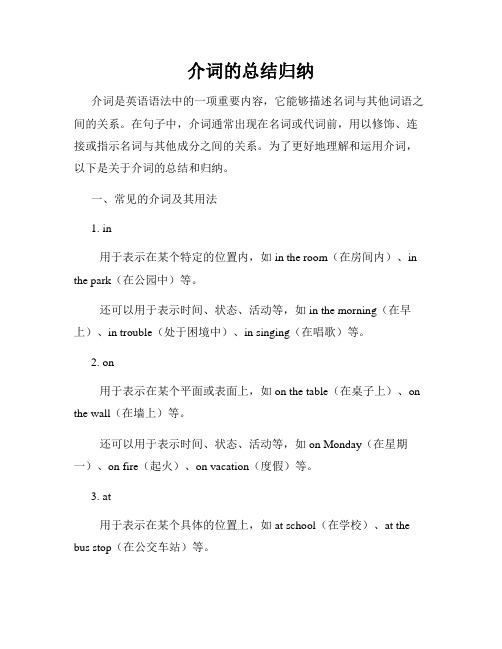
介词的总结归纳介词是英语语法中的一项重要内容,它能够描述名词与其他词语之间的关系。
在句子中,介词通常出现在名词或代词前,用以修饰、连接或指示名词与其他成分之间的关系。
为了更好地理解和运用介词,以下是关于介词的总结和归纳。
一、常见的介词及其用法1. in用于表示在某个特定的位置内,如 in the room(在房间内)、in the park(在公园中)等。
还可以用于表示时间、状态、活动等,如 in the morning(在早上)、in trouble(处于困境中)、in singing(在唱歌)等。
2. on用于表示在某个平面或表面上,如 on the table(在桌子上)、on the wall(在墙上)等。
还可以用于表示时间、状态、活动等,如 on Monday(在星期一)、on fire(起火)、on vacation(度假)等。
3. at用于表示在某个具体的位置上,如 at school(在学校)、at the bus stop(在公交车站)等。
还可以用于表示时间、活动等,如 at noon(在中午)、at a party (在派对上)等。
4. to用于表示运动的方向或目的地,如 go to school(去学校)、senda letter to her(给她发信)等。
还可以用于表示时间,如from Monday to Friday(从周一到周五)等。
5. for用于表示目的、原因或受益人,如 buy flowers for her(给她买花)、study for the exam(为了考试而学习)等。
6. with用于表示伴随、一起、使用等,如 go shopping with friends(和朋友一起去购物)、write with a pen(用钢笔写)等。
7. by用于表示通过某种方式或由某人完成某事,如 travel by train(乘火车旅行)、written by Mark(由马克写的)等。
初中英语语法复习之介词讲解-(共50张PPT)
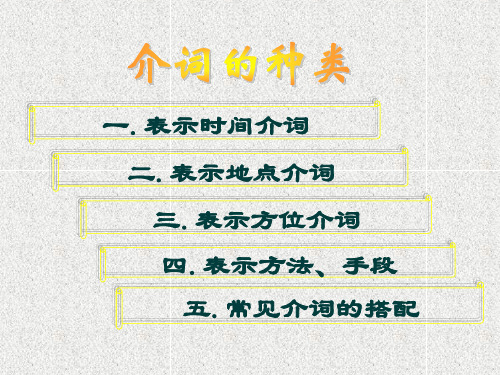
8.in a read coat, the girl in yellow, the boy in white…
3. in English , in French , in your own words, in three language… ____使_用_语__言_用__介_词__in_______
4. in a loud voice, in a low voice… ___使__用_声_音__用_介_词__i_n_____
A. on, over B.above, on C.over, on 5.The sun rose ___the horizon(地平线).
A. on B. above C.over 注意: on 接触平面
over 在平面的正上方 above 在上方
3. in + 大地方 at + 小地 方 on +门牌,某层楼
in space…
____表__示__大__地__方__用__i_n______
❖ 3. in the box, on the chair, under the desk, next to Kate, on the right of Lucy, in front of the house, behind the door…
介词:通常用在____代_词____、___名_词___、__动_名__词__
之前,表示某个人、事物/东西、事件与 另一个之间的___关__系____。
初中英语语法知识点:介词.数词.句型
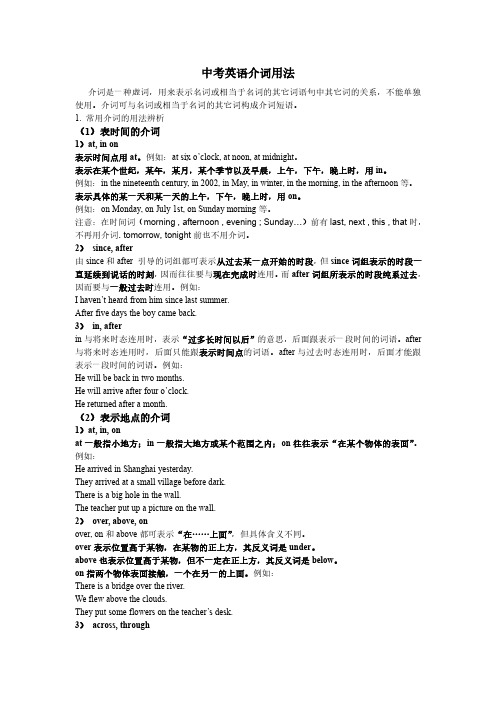
His grandpa still lives in this small short house. 他爷爷还住在这个矮小的房子里。
--- Three, please.(作宾语)
The nine boys are from Tianjing.(定语)
Six plus four is ten.(表语) We four will go with you.(同位语) (2) 表示一个具体数字时,hundred, thousand, million 一律不用复数;在表示 一个不确定数字时则用复数。例如: Our country has a population of 1,300 million people. There are three thousand students in our school. After the war, thousands of people became homeless. Maize is the most important food crop for millions of people in the world. They arrived in twos and threes. (3) 表示“……十”的数词的复数形式可用来表示人的岁数或年代,例如:
c. 主语+谓语+倍数(分数)+ 形容词(副词)比较级+ than…
The grain output is 8 percent higher this year than that of last year. 今年比去年粮食产量增加 8%。
d. 还可以用 by+倍数,表示增加多少倍 The production of grain has been increased by four times this year. 今年粮食产量增加了 4 倍。
英语介词详解

英语介词详解
介词在英语中是一种虚词,用于表示名词或代词与句子其他部分之间的关系。
以下是介词的详细解释:
1.定义:介词是用于描述名词或代词与句子其他部分之间关系的词。
它们通常
放在名词或代词之前,表示方向、位置、时间、方式等。
2.功能:介词的主要功能是帮助建立名词或代词与其他句子成分之间的关系,
提供更多的语境和背景信息。
3.常见介词:以下是一些常见的英语介词:at、in、on、by、with、about、
over、before、after、during等。
4.用法:介词的用法非常灵活,需要根据上下文和语境来判断。
例如,在句子
“The book is on the table”中,介词“on”表示“在……上面”;在句子“I will meet you at the train station”中,介词“at”表示“在……
地方”。
5.注意事项:使用介词时需要注意一些常见错误,如多余的介词、缺少介词或
使用不当的介词等。
正确使用介词可以提高英语表达的准确性和流畅性。
介词是英语中一个非常重要的语言元素,正确使用介词可以帮助我们更好地表达思想,建立句子之间的关系,提高语言的质量。
新初中英语语法知识—介词的真题汇编及答案解析(2)

一、选择题1.He is__________ outgoing student long hair..A.a,with, B.an,with C.a,of D.an,of2.— Are you going to school________bus?—No, we are going________Mary’s mother’s car.A.by, by B.from, by C.by, in D.in, at3.—Do you know the girl ________ red skirts?—Yes, she is my sister.A.at B.on C.in D.to4.Lily and Lucy _______ their mother. They have big eyes and yellow hair.A.like both B.both are like C.both like D.are both like 5.Our school plans to have a parents’ meeting_______ the afternoon_______ January 27th. A.in; of B.on; in C.on; of D.in; at 6.—Mary's birthday is ________ March. What about Lucy's?—Her birthday is ________ December 10th.A.in;on B.on;in C.on;on7.---Would you like some coffee?--Yes, and please get me some milk. I prefer coffee _________ milk.A.on B.to C.for D.with8.Lily often goes to visit her grandma ______ Sundays.A.at B.in C.on D.to9.My uncle has taught in this school________ he was twenty years old.A.after B.for C.until D.since 10.Taiwan is __________ the southeast of China and Hunan is __________ the south of Hubei. A.in;in B.in;on C.on;in D.on;to 11.Jenny’s math lesson is________nine________Friday morning.A.in; on B.at; on C.on; in D.at; in12.The old man arrived _________ the village _______ a rainy night.A.at; on B.on; at C.in; at D.on; in 13.Thanks ______your family photos, they are very nice.A.to B.in C.for D.at14.I want to learn English well because I don’t want to talk with foreigners ________ anybody else.A.by B.through C.across D.at15.---What’s your hobby ? ---______collecting balls, I also like different kinds of CDs. A.Besides B.Except C.Beside D.About16.We usually have our school trip _______ a morning of April.A.on B.at C.to D.in17.—Where is Tom?—He is playing football ___________ the playground.A.of B.to C.on D.from 18.There is a computer _______ the desk.A.on B.in C.under D.for19.The accident took place ________ a cold February evening.A.on B.in C.at D.for20.— Hey, Nancy. What do you usually do ________ rainy days? — I usually listen to music. A.in B.on C.at D.to21.Bill doesn't like playing football,but he often watches football matches (比赛)_____ TV. A.in B.on C.to D.with22.After working her way around the world, Annie ended up English as a foreign language. A.teach B.taughtC.teaching D.to teach23.Tom was born________London________May lst, 2001.A.in; in B.in; on C.on; on D.on; in 24.—Hi, Jane. What time do you get up __________ weekdays?—I usually get up __________ about six o’clock.A.in; at B.on; at C.at; at D.on; on 25.—When does your mother go shopping?—Usually Sunday morning.A.on B.in C.at D.after【参考答案】***试卷处理标记,请不要删除一、选择题1.B解析:B【解析】【分析】【详解】句意:他是一位留着长发的外向的学生。
初中英语语法 介词的用法辨析(in after for since)

现在是5点。我一个小时之后回来。 has gone to Singapore. He will be back in a week. 我叔叔已经去了新加坡。他将在一周之后回来。
现在是5点。我一个小时之后回来。
“in+时间段” 表将来的时间
②“after+时间点或时间段”中的after是以除 现在以外的一个具体时间为基准,动作在 那个基准点之后发生。后接时间段常用 于一般过去时,后接一个具体的时间点, 常用于一般过去时或一般将来时。
由for, since短语修饰的 主句常用完成时态或完成 进行时态,因此句子中的谓 语动词需为延续性动词。
The factory has been there since spring 1999. 那家工厂自从1999年春天就在那里了。
She hasn't been home since her marriage. 自结婚以后她就未曾回过家。
初中英语语法 常用介词的用法辨析(2)
in, after ①“in+时间段”表示“在⋯⋯之后”,常是以说话时间为 基准来计算时间的。表示需要多长时间之后动作才 能发生,谓语动词常用一般将来时。
My uncle has gone to Singapore. He will be back in a week. It's five ill come back in an hour(=at six o'clock).
。
since还可用作连词,意为“自从”,引导时间状语从句, 主句用完成时态,从句用一般过去时。
I have been working in this factory since I graduated in 2003. 自从2003年毕业后我就在这家 工厂工作。
- 1、下载文档前请自行甄别文档内容的完整性,平台不提供额外的编辑、内容补充、找答案等附加服务。
- 2、"仅部分预览"的文档,不可在线预览部分如存在完整性等问题,可反馈申请退款(可完整预览的文档不适用该条件!)。
- 3、如文档侵犯您的权益,请联系客服反馈,我们会尽快为您处理(人工客服工作时间:9:00-18:30)。
一、选择题1.He is__________ outgoing student long hair..A.a,with, B.an,with C.a,of D.an,of2.The boy read English________every morning ________the age of ten.A.on; in B.on; at C.in; at; D./; at 3.—What do you use the shelf ______?—I use it ______ books.A.to; to keep B.to; keepC.for; to keep D.for; keep4.The old man arrived _________ the village _______ a rainy night.A.at; on B.on; at C.in; at D.on; in5.— Are you going to school________bus?—No, we are going________Mary’s mother’s car.A.by, by B.from, by C.by, in D.in, at6.The bird’s singing came into my room ______ the window and woke me up in the early morning.A.down B.from C.through D.across7.--There are many theatres _________the island.--Yes, Broadway is the southern end of the island..A.at; at B.on; on C.at; on D.on; at 8.Although he was ____________ my opinion, the old professor didn’t come up with his own. A.against B.on C.for D.in9.—Mary's birthday is ________ March. What about Lucy's?—Her birthday is ________ December 10th.A.in;on B.on;in C.on;on10.My uncle has taught in this school________ he was twenty years old.A.after B.for C.until D.since 11.Taiwan is _________ the southeast of China.A.to B.in C.from D.on12.It is reported that he won an award________Best Actor________his role in that film. A.as; in B.as; for C.for;for D.for; in 13.Thanks ______your family photos, they are very nice.A.to B.in C.for D.at 14.—Where is Hubei?—It’s _______ the north of Hunan.A.in B.to C.on15.We have four lessons ________ the morning.A.in B.on C.at D.for16.I can’t go out ________ school nights because I have to finish my homework first.A.at B.in C.on17.-What are they talking ________?-I am not sure. Because they are talking ______English, I don't know English .A.to; with B.to; inC.with; about D.about; in18.—How long have you lived in this town?—________2001.A.since B.in. C.for19.Look! The girl ________ green clothes is my sister and the boy ________ big eyes is my brother.A.in; has B.in a; has a C.in; with D.in a; with a 20.He often has lunch ______ about twelve o'clock.A.in B.at C.on D.with21.— Hey, Nancy. What do you usually do ________ rainy days? — I usually listen to music. A.in B.on C.at D.to22.This pair of jeans looks nice _____ Sandy, because she looks very nice _____ blue. A.on; in B.in; on C.for; on D.to; in23.---Do you prefer coffee _____milk in it?---Sometimes, but most of the time I ______drink black coffee.A.or, would rather B.with, prefer C.with, would rather D.to, prefer 24.Tom was born________London________May lst, 2001.A.in; in B.in; on C.on; on D.on; in25.The Qingming Festival of this year falls _____ April 5th and thousands of cars poured into high-ways _____ the early morning of the holiday.A.on; in B.in; on C.on; on D.in; in【参考答案】***试卷处理标记,请不要删除一、选择题1.B解析:B【解析】【分析】【详解】句意:他是一位留着长发的外向的学生。
Outgoing第一个因素是原因,所以用an; with结构作定语。
所以选B。
2.D解析:D【解析】【详解】句意:那男孩十岁时每天早晨读英语。
考查介词辨析。
on 在……后加星期几,节日前,具体的日期;in 在……;后加一天中的上午,下午或晚上;加月份,年,季节等;at加具体的时间点,或固定搭配。
every morning 每天早上,前面不加介词;短语at the the age of…表示“在某人多大岁的时候” at the age of ten表示“在10岁的时候”。
根据题意,故选D。
3.C解析:C【解析】【详解】句意:——你使用那个架子干什么?——我用它来保存书籍。
考查介词用法和不定式作宾语补足语。
to表示目的或意图;keep保存;for为了。
分析句子结构可知要用介词for与疑问句what搭配表示“为了什么”,to后需接动词原形构成不定式,不符合题意;use sth. to do sth.用某物来做某事,第二空用动词不定式表目的。
故选C。
4.A解析:A【解析】【详解】句意:那位老人在一个雨夜到达了那个村庄。
本题考查介词。
at在,on在……上面,in在……里。
arrive at表示到达小地点;arrive in表示到达大地点。
到达一个小村庄,用arrive at。
表示在一个下雨的夜晚,用介词on。
故选A。
5.C解析:C【解析】【详解】句意:——你将要乘坐公交车去上学吗?——不,我们将乘坐玛丽母亲的车去。
本题考查介词。
from来自,at在,表示“乘坐……”,用by+表示交通工具的单数名词,或者in+one’s+表示交通工具的单数名词;by bus乘坐公交车,in Mary’s mother’s car乘坐玛丽母亲的车。
故选C。
6.C解析:C【解析】【详解】句意:鸟儿的歌声透过窗户进入我的房间,一大早就把我吵醒了。
本题可用“语境分析法”解答。
down“沿着;向下”;from“来自”;through“(从物体内部或空间)穿过”;across“(从物体表面)穿过”。
由句意“鸟的歌声从窗户传进我的房间……”可知选C。
7.D解析:D【解析】【分析】【详解】句意:——这个岛上有许多剧院_。
——是的,百老汇是在岛的最南端。
表示在某个岛上习惯用介词on,即on the island;at the end of在……的末端。
故选D。
8.A解析:A【解析】试题分析:句意:虽然老教授反对我的意见,但是他没有提出自己的观点。
against 反对,违背的意思, on表示在……上,in表示在……内,不能和opinion构成固定搭配,而for my opinion 可以翻译为赞成我的意见,结合后句的转折,故选A。
考点:考查介词的用法。
9.A解析:A【解析】【分析】【详解】句意:--Mary的生日在三月,Lucy的呢?—他的生日在10月10日。
考察时间介词。
在月份前用介词in, 在具体日期前用介词on, 故选A。
【点睛】时间介词用法口诀:周月季年长时间in需放在其前面;at用于时刻前,也与正午午夜连;on用于具体某一天。
10.D解析:D【解析】【分析】【详解】句意:我的叔叔在他20岁的时候就在这个学校教书了。
考查现在完成时。
after在……之后;for为了;until直到;since自从。
根据题干中的“has taught”可知是现在完成时,现在完成时的时间标志词:since+时间点;for+时间段;he was twenty years old他20岁的时候是时间点,要用since。
故选D。
11.B解析:B【解析】【分析】【详解】句意:台湾在中国的东南方。
考查介词的用法。
in表示在范围内;on表示接壤;to表示不接壤;from是来自。
根据句意以及常识可知,台湾在中国的东南方,在中国范围之内,故选B。
12.C解析:C【解析】【详解】句意:据报道,他因在那部电影中的角色而获得最佳男演员奖。
